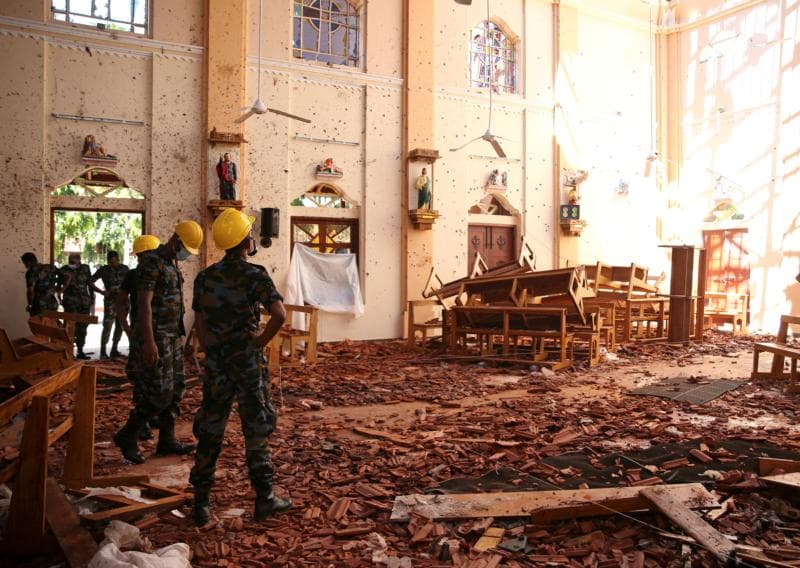LEICESTER, United Kingdom – Increasing severity in the persecution of Christians in different parts of the world is reaching “genocidal” levels, according to a new report commissioned by the British government.
An interim report issued on Friday by an Independent Review set up at the request of the UK foreign secretary said that Christians are overwhelmingly the most targeted religious group in the world, and that “acts of violence and other intimidation against Christians are becoming more widespread.”
The review has been led by Anglican Bishop Philip Mounstephen of Truro.
“I have to say that although I am personally experienced in the life of the global Church having visited in South America, in the Middle East, in Africa, in Asia and in many other places as well, I am nonetheless deeply shocked by the scale, the scope and the severity of this phenomenon,” the bishop said in a statement.
The report was announced on Dec. 26, 2018, by Foreign Secretary Jeremy Hunt, and due to be concluded by Easter. However, Mounstephen said the scale of the problem was too large and won’t have a final report until the summer. The interim report released on May 3 focuses on “the scale and nature of the problem.”
“Evidence shows not only the geographic spread of anti-Christian persecution, but also its increasing severity. In some regions, the level and nature of persecution is arguably coming close to meeting the international definition of genocide, according to that adopted by the UN. The eradication of Christians and other minorities on pain of ‘the sword’ or other violent means was revealed to be the specific and stated objective of extremist groups in Syria, Iraq, Egypt, north-east Nigeria and the Philippines. An intent to erase all evidence of the Christian presence was made plain by the removal of crosses, the destruction of Church buildings and other Church symbols. The killing and abduction of clergy represented a direct attack on the Church’s structure and leadership. Where these and other incidents meet the tests of genocide, governments will be required to bring perpetrators to justice, aid victims and take preventative measures for the future,” the report says.
The document notes that the main impact of such genocidal acts against Christians is an exodus from the region, with Christianity now facing “the possibility of being wiped out in parts of the Middle East where its roots go back furthest.”
“In Palestine, Christian numbers are below 1.5 percent; in Syria the Christian population has declined from 1.7 million in 2011 to below 450,000; and in Iraq, Christian numbers have slumped from 1.5 million before 2003 to below 120,000 today. Christianity is at risk of disappearing, representing a massive setback for plurality in the region,” the report continues.
The report notes that violent persecution exists “in many forms,” and can include both state and non-state actors. It lists church bombings, extrajudicial killings, enforced “disappearance”, and the kidnapping of Christian girls as some of the actions which regularly affect Christian communities in parts of the world.
It also mentions the “social persecution” many Christians face, saying it is “often structural in nature and harder to detect, but is the type of persecution which the majority of persecuted Christians are experiencing because it is so far reaching in every area of life.”
The report offers a synopsis of how Christians are being persecuted in different parts of the world, including the Middle East and North Africa; South Asia; East Asia; Central Asia; and Latin America.
“The regular, widespread discriminatory behavior against minority communities is interspersed with major incidents such as the Easter Sunday massacres in Sri Lanka (the third Easter in a row that has been targeted by radical Islamists). The problem with the rolling global news cycle is that today’s outrage against the Christian Community is all too soon forgotten and replaced by the next,” the report says.
Speaking to reporters on Thursday after receiving the report, Hunt said the British government had been “asleep on the watch when it comes to the persecution of Christians.”
The foreign secretary blamed “political correctness” and Britain’s history as a colonial power for the government avoiding confronting the issue.
“I think there is a misplaced worry that it is somehow colonialist to talk about a religion that was associated with colonial powers rather than the countries that we marched into as colonizers. That has, perhaps, created an awkwardness in talking about this issue: The role of missionaries was always a controversial one and that has, I think, also led some people to shy away from this topic,” he said.
“What we have forgotten in that atmosphere of political correctness is actually the Christians that are being persecuted are some of the poorest people on the planet,” Hunt added.
In the final report, expected by the end of June, the Independent Review will look at the work of the UK Foreign Office over the past five years, “specifically in its role to support the 80 percent of persecuted believers who follow Jesus Christ.”
“In short I will be assessing what would be the appropriate response to the needs of the numerically average Christian believer, a young 16 year old Nigerian Christian woman whose rights may well have been taken away in the prime of youth and promise,” Mounstephen said.
The bishop added that the final conclusions and recommendations “may be uncomfortable to hear.”
“The challenge for ministers and FCO civil servants will be to turn these into workable solutions that can be implemented. The challenge for the rest of our community will be to partner with some of the finest diplomats in the world to ensure that the freedoms that Britain was at the forefront of creating become a reality for both Christians, and people of all faiths and none, around the world today,” he said.















